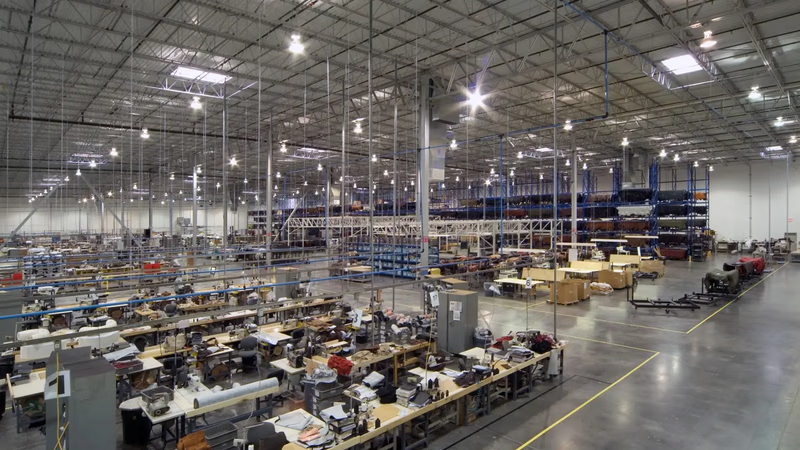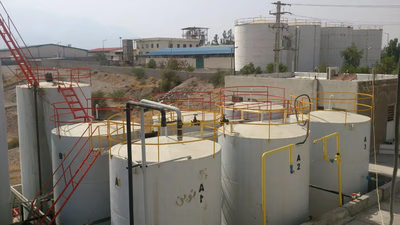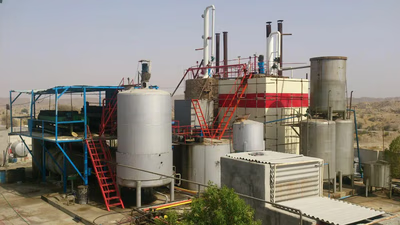
Industrial properties for investment in the Middle East market.
Foreign investors interested in investing in industrial real estate can be interested in different types of industrial real estate . Foreign investors generally seek to invest in factories and production units. These properties include industrial plants, workshops, production units and processing units of various materials. Investing in warehouses and sheds is also attractive to foreign investors. These properties are used for storage, distribution and logistics of goods.
In direct investment, foreign investors invest directly in industrial real estate. They can buy real estate, build and develop real estate, or launch joint projects with local partners. Foreign investors may establish industrial properties through their subsidiaries or branches in the target country. These companies are usually registered as local companies and conduct investment operations in that country.
In investing through joint ventures, foreign investors sign partnership agreements with domestic partners and form joint ventures. In this form of investment, both parties jointly participate in the investment and management of industrial properties by dividing shares and responsibilities. Foreign investors may purchase shares of domestic companies related to industrial real estate. This form of investment can be done through the purchase of public shares in the stock market or through the purchase of shares from the current shareholders of the companies.
Shopping and commercial centers are also usually considered attractive places for foreign investors. These properties include shopping complexes, arcades, business centers and entertainment centers. Construction and operation of ports and logistics facilities can also be attractive for foreign investors. These properties are used as locations for international transportation of goods and services related to logistics. Office buildings may also be attractive to foreign investors. These properties include office buildings, business centers, corporate complexes and work spaces. Investing in hotels and tourist places can also be attractive for foreign investors. These properties include hotels, restaurants, recreational villas and tourist places.
Foreign investors may be interested in investing in industrial properties related to mineral resources. These properties include mines, mineral processing plants and equipment related to the mining industry. Investing in industrial real estate related to technology and innovation may also be attractive to foreign investors. These properties include science and technology parks, knowledge cities and research and development centers. Foreign investors are usually interested in investing in the transportation sector. These properties include ports, airports, railway stations, transportation terminals, and distribution and logistics centers.
Foreign investors may be interested in investing in the processing and production of food products. These properties include food processing plants, cold stores, food manufacturing units and related industries. Foreign investors may be interested in investing in the healthcare sector. These properties include hospitals, health centers, clinics, laboratories and facilities related to healthcare services. Foreign investors are interested in investing in industrial properties related to information and communication technology (IT). These properties include data centers, information technology companies, research and development centers in the field of IT and work spaces related to the IT industry. Foreign investors may be interested in investing in the biotechnology sector. These properties include biotechnology companies, biotechnology research and development centers, and biotechnology product production units.
Foreign investors are interested in investing in energy enterprises such as power plants, solar power plants, wind power plants, nuclear power plants and electricity distribution substations. Free trade zones, which are formed as special industrial and commercial parks, are highly attractive to foreign investors. These areas provide special opportunities for business and investment. Industrial towns, which are designed and built as industrial complexes, offer foreign investors a good opportunity to invest in industrial properties. These towns usually have industry-related facilities and services.
Foreign investment funds may invest in industrial real estate. These funds usually collect crowdfunding from individuals and investors and invest it in industrial real estate. Foreign investors can get involved in investing in industrial real estate by granting loans to other companies or governments. These loans can be in the form of bank facilities, bonds or other financial instruments. In some cases, foreign investors can buy related industries instead of directly investing in industrial properties. This form of investment includes the purchase of factories, production units, distribution and sales network and other industries related to industrial properties.
-

Selling or leasing factories to foreign companies can mitigate risks for artisans, including production and regulatory challenges. By transferring ownership, industrialists can leverage the expertise of foreign firms, potentially benefiting from financial incentives offered by governments to attract foreign investment. However, due diligence is crucial; assessing the financial stability of the foreign buyer is essential to avoid issues like non-payment or operational shutdowns. Political and regulatory changes in the buyer"s country can also impact factory operations. While access to advanced technologies and processes may enhance production efficiency, it could also intensify domestic competition. Cultural and language barriers may complicate communication between local artisans and foreign buyers, necessitating clear agreements. Financial constraints often drive industrialists to consider selling or leasing their factories, allowing them to focus on core business activities while reducing operational burdens. Additionally, utilizing existing infrastructure in other countries can lower costs and expedite operations.
Despite these advantages, risks such as security concerns over proprietary information must be addressed through proper safeguards. "
-

Industrial real estate transactions involving foreign nationals necessitate a thorough understanding of property laws, tax regulations, and market conditions in both countries. Consulting local experts, such as real estate lawyers, is crucial for navigating the complexities of international transactions. Each country may impose specific restrictions on foreign ownership of industrial properties, making it essential to verify the legality and enforceability of contracts. Accurate translation of documents is vital when dealing with multiple languages to ensure clarity in agreements. Financial considerations, including local taxes and maintenance costs, must be carefully evaluated before proceeding with a transaction. Risk management plays a significant role; thus, conducting detailed inspections and technical reviews of properties is recommended to identify potential issues. Negotiating terms and ensuring all contractual details are correct is critical for successful transactions. Additionally, understanding currency restrictions and settlement methods between countries can prevent complications during the transaction process.
For selling or renting industrial properties, determining the right price through expert appraisals and adhering to lease agreements are necessary steps. Effective advertising strategies can facilitate quicker sales while maintaining caution regarding personal and financial information is paramount throughout the process. Engaging experienced advisors can provide valuable insights tailored to specific transaction conditions.
-

Industrial zones in the Middle East and West Asia are increasingly appealing to foreign investors due to several key factors. The type of industry present significantly influences investment attraction, with sectors that can compete globally being more desirable. A large and growing market is crucial, as it draws investors seeking robust opportunities. Strong export markets further enhance this appeal. Infrastructure plays a vital role; regions with reliable electricity, water supply, transportation networks, and communication systems create an inviting environment for investment. Additionally, clear laws and regulations regarding foreign investment bolster investor confidence. Countries like the UAE, Saudi Arabia, Qatar, Oman, Turkey, and Iraq showcase some of the best industrial areas for foreign investment. The UAE"s cities of Dubai and Abu Dhabi stand out for their excellent infrastructure and legal frameworks.
Saudi Arabia"s major cities offer significant domestic market potential. Qatar"s dynamic industrial sector is exemplified by Doha and Ras Laffan Industrial Zone. Oman’s Sahab Industrial Zone is recognized for its stability and investment opportunities. Turkey benefits from a large domestic market and strategic location, while Iraq"s rich resources make its industrial centers attractive as well. To maximize foreign investment potential in these regions, it is essential to focus on industry type, market size, infrastructure quality, regulatory clarity, and overall growth prospects.
-

Foreign investors are increasingly drawn to various types of industrial real estate, including factories, warehouses, and logistics facilities. Direct investment options allow them to purchase or develop properties, while joint ventures with local partners offer shared management opportunities. Attractive investment areas include shopping centers, ports, and office buildings. Additionally, sectors such as healthcare, technology, and energy present lucrative prospects for foreign capital. Industrial properties related to mineral resources and food processing also attract interest. Free trade zones and industrial towns provide unique advantages for investors seeking favorable business environments. Investment funds and loans further facilitate foreign participation in the industrial real estate market.




